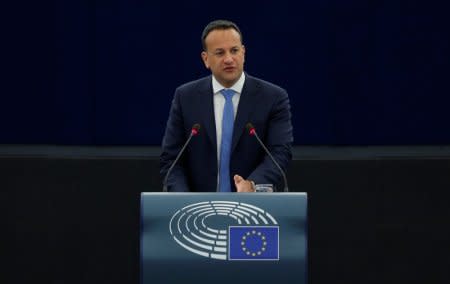Second vote not undemocratic, Irish PM says on Brexit

Thomson Reuters
STRASBOURG (Reuters) - It would not be "anti-democratic" for Britons to reverse their Brexit vote in a second referendum, Irish Prime Minister Leo Varadkar said at the European Parliament on Wednesday, but he denied working to promote one.
During exchanges in Strasbourg, Varadkar rejected an accusation by the UK Independence Party's Nigel Farage that he was conspiring with the likes of former British premier Tony Blair to thwart Britain's departure from the European Union by resisting London's efforts to keep full access to EU markets.
Varadkar cited close cultural ties between Ireland and Britain, including his own immediate family, as a reason why he was arguing for the closest possible relationship between the EU and Britain after Brexit next year. But he insisted London could not keep EU rights while rejecting some of its obligations.
"I'm certainly not party to any plot against the United Kingdom," he told reporters. "I'm a friend of the United Kingdom."
Farage, the former UKIP leader who still leads the party in the EU legislature, accused Varadkar of risking Irish trade with Britain out of loyalty to an EU integration project which he said would unravel further after Brexit. He suggested Varadkar was pushing for Britain to reverse its referendum vote to leave.
Having revived debate in Britain this month about a second referendum by saying he believed that one was increasingly likely, Farage noted how Ireland reversed its veto of the EU's Lisbon Treaty by holding a second referendum in 2009:
"You are part of course of a big attempt here and elsewhere to frustrate and to attempt to overturn Brexit," he told Varadkar. "I don’t want a second referendum on Brexit. Absolutely not. But I fear that you are all working together with Tony Blair and Nick Clegg to make sure we get the worst possible deal."
Varadkar told reporters he had never met Blair though had encountered Clegg, a former deputy prime minister. He insisted, however, that it would be counter-productive for him as a foreigner to tell Britons what they should do.
Nonetheless, he added, Ireland had reversed referendum decisions before, including to overturn a ban on divorce, and might soon reverse a previous referendum vote curbing abortion:
"I don't think it's anti-democratic for anyone to change their mind or have a second vote. But any decision on the second referendum must only be one for the UK parliament and the UK people."
British Prime Minister Theresa May, who campaigned against Brexit in 2016, has insisted that she will see it through, despite a flurry of statements this week by EU leaders that they would welcome Britain changing its mind.
During an earlier debate in Strasbourg on Wednesday, EU chief executive Jean-Claude Juncker said he would also welcome Britain applying to re-join the bloc in the future.
(Reporting by Alastair Macdonald and Samantha Koester in Brussels; @macdonaldrtr; Editing by Raissa Kasolowsky)
See Also:

 Yahoo News
Yahoo News 
